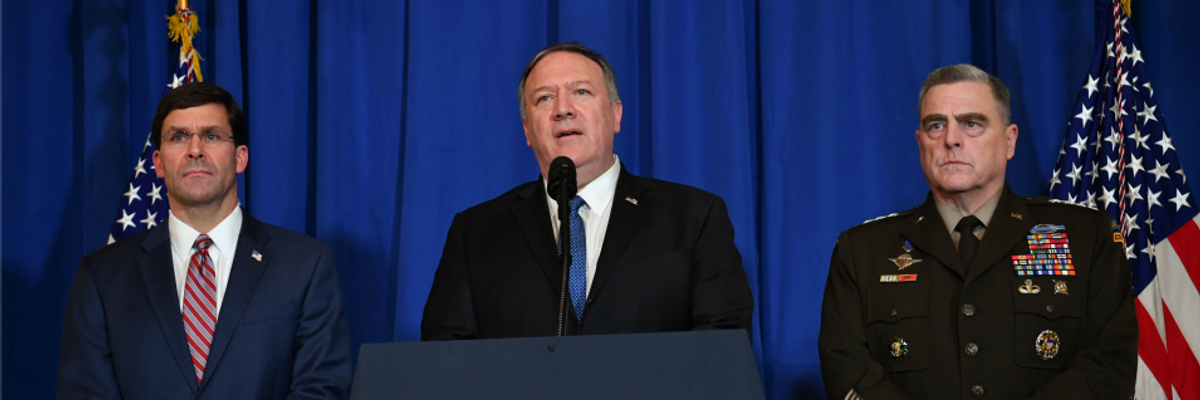An attorney who sued George W. Bush over the 2003 invasion of Iraq said Saturday that the U.S. assassination of Iranian General Qasem Soleimani on orders from President Donald Trump constitutes an "act of aggression" and a violation of international law.
Dave Inder Comar, executive director of the non-profit human rights law firm Just Atonement Inc., argued in a Common Dreams op-ed Saturday that the Trump administration's attempt to justify the drone strike on Soleimani as a legal "defensive action" does not comport with the facts.
"The United States most likely committed an act of aggression against Iran and killed Soleimani in violation of human rights law," Comar wrote.
Comar argued the U.S. assassination of Soleimani fits two distinct International Criminal Court (ICC) definitions of "aggression."
There are two important ICC definitions of aggression that are relevant here. First, an act of aggression can be, "an attack by the armed forces of a State on the land, sea or air forces, or marine and air fleets of another State"--in other words, attacking another state's military. The killing of Soleimani would seem to fall under this definition, as he was a high-ranking military official in Iran...
The second important definition from the ICC identifies aggression as, "the use of armed forces of one State which are within the territory of another State with the agreement of the receiving State, in contravention of the conditions provided for in the agreement or any extension of their presence in such territory beyond the termination of the agreement." In other words, armed forces lawfully in a third party's country suddenly acting unlawfully and in breach of the agreement may constitute aggression.
"Under two separate International Criminal Court (ICC) definitions of 'aggression,'" Comar noted, "the U.S. likely committed an act of aggression against Iran in assassinating Soleimani."
As Common Dreams reported earlier Saturday, the Trump administration has repeatedly claimed it killed Soleimani in an effort to thwart "imminent" attacks on Americans in Iraq. But, pressed by reporters, the administration has yet to provide evidence to substantiate that claim.
In response to the Trump administration's claim of "anticipatory self-defense"--a justification also used by the Bush administration to invade Iraq--Comar wrote "this international legal standard is extremely difficult to meet."
"Under Article 2(4) of the United Nations (U.N.) Charter, a breach of international peace is only permitted when authorized by the U.N. Security Council or conducted in an act of self-defense. Self-defense means fending off an armed attack," Comar noted. "Absent evidence of such an extraordinary attack against the United States, 'anticipatory' self-defense, e.g., Pompeo's stance that the killing was a 'defensive action,' likely cannot be legally justified."
Comar wrote that Soleimani's assassination "marks the most dangerous escalation between the United States and Iran in recent history, from which Iran and Iran's neighboring countries will suffer the most."
"Under the U.N. Charter, Iran and the United States have a legal obligation to settle their disputes peacefully," Comar added. "As a permanent member of the U.N. Security Council, the United States has the ability at any time to discuss threats against it. It has chosen not to do this, instead using almost-certainly illegal force against another U.N. member country. The consequences will be grave."
Comar is far from the only legal expert to conclude that the U.S. assassination of Soleimani was illegal under international law.
Agnes Callamard, the U.N. special rapporteur on extra-judicial executions, tweeted late Thursday that the killing of Soleimani "is most likely unlawful and violate[s] international human rights law."
Yale law professor Oona Hathaway agreed, writing in a series of tweets Friday that "based on what we currently know, the U.S. strike on Maj. Gen. Qassem Soleimani is legally tenuous under both domestic and international law."
"Congress should begin hearings and demand answers about the legal basis and the plan for handling the inevitable fallout," Hathaway said.




